九年级unit8知识点、句型总结
九年级人教版英语8单元知识点及重点句型

九年级英语Unit 8短语动词小结常见短语动词结构有下面几种:1.动词+副词如:give up 放弃 turn off 关掉 stay up 熬夜这种结构有时相当于及物动词,如果其宾语是代词,就必须放在动词和副词之间,如果是名词,则既可插在动词和副词之间,也可放在短语动词后。
2. 动词+介词如:listen of 听 look at 看 belong to 属于这种结构相当于及物动词,后面跟宾语。
3. 动词+副词+介词如:come up with 提出,想出run out of 用完,耗尽 4. 动词+名词(介词) 如:take part in参加 catch hold of 抓住 1.cheer (sb.) up 使(某人)高兴、振作如:cheer me up 使我高兴 clean up 打扫 clean-up n. 打扫2. homeless adj. 无家可归的 a homeless boy 一个无家可归的男孩 home n. 家3. hand out 分发 hand out bananasgive out 分发 give out sth to sb. 分….给某人 give up doing 放弃… give up smoking 放弃吸烟give away 赠送捐赠 give away sth. to …. give away money to kid s give sb. sth. 给某人某东西 give me money 给我钱 give sth. to sb. 给某人某东西 give money to me 给我线 4. sick adj. 生病的作表语、定语ill adj. 生病的作表语,不能作定语 5. volunteer to do v. 志愿效劳、主动贡献 volunteer n. 志愿者6. come up with 提出想出 === think up 想出 catch up with 赶上追上 7. put off doing 推迟做某事 put on 穿上 (指过程) put up 张贴8. write down 写下记下9. call up 打电话 make a telephone call 打电话10. set up 成立建立The new hospital was set up in 2000. 这座医院是在2000年成立的。
人教版新目标英语九年级-Unit8单元知识点小结及练习附答案

人教版新目标英语九年级-Unit8单元知识点小结及练习附答案Unit 8 It must belong to Carla.短语1. belong to… 属于…2. hair band 发带3. go to/attend a concert 参加音乐会4. in the music hall 在音乐大厅5. something valuable/unusual 贵重/不寻常的东西6. something strange 奇怪的事情7. at the picnic 在野餐时8. the rest of.... 其余的……9. pick it up 捡起,拾起 10. each other=one another 互相,彼此 11. nothing much 没什么(事) 12. go to a picnic=go for a picnic 去野餐 13. anything else 其它的东西 14. be interviewed by... 被…采访 15. strange noises 奇怪的 16. outside our window 在我们的窗外 27. run after 追赶 28. run to do sth. 跑着去做某事 29. must be dreaming 一定在做梦 30. run for exercise 跑步锻炼31. make a movie 拍电影32. wear a suit 穿西服/套装33. express a difference / result 表达差异 / 结果34. add information 添加信息35. at the same time 同时36. a rock circle 一个石头圈 37. most famous historical places最著名的历史名胜38. a group of… 一群… 39. a bit late 有点晚儿40. communicate with ...与……交流41. so many centuries ago 许多世纪前42. point out 指出17. next-door neighbor 隔壁邻居18. at first 首先,起初19. run away 逃走20. feel uneasy 感到不安21. have no idea=don't know 不知道22. a long period of time 很长一段时间23. have fun doing sth. 做某事开心24. create fear制造恐惧25. There must be …doing sth. 一定有…在做某事26. cough a lot 咳得厉害43. put together 放在一起44. in a certain way 以某种方式45. on midsummer's morning 在仲夏的上午46.shine directly into… 直接照进…47. the center of ... ……的中心48. move up 上升,提升49. the position of... …的位置50. burial place 墓地51. a place to honor ancestors祭拜祖先的地方52. celebrate a victory over an enemy庆祝战胜敌人巩固提升单项选择1. Do you know _____ bag it is? A. when B. who's C. whose D. where2. The man you saw at the park ___ be Jane. She is at work now. A. must B. might C. can D. can't3. The man has _____ many things from the store. A. steal B. stole C. stolen D. stealing4. Did you find your lost key?—No, but I think _____ must have picked it up.A. nobodyB. somebodyC. anybodyD. everybody5. I wonder _____ he will come back tomorrow. A. unless B. if C. though D. even6. I used to _____ up early. A. get B. got C. to get D. getting7. Is there _____ in today's newspaper?—No.A. important somethingB. important anythingC. something importantD. anything important8. I hear someone _____ in the room now. A. sing B. to sing C. singing D. sang9. Would you like anything _____, sir?—No, thank you. A. special B. else C. more D. even10. We went to Hainan Island on May Day and had great fun _____ in the sea.A. surfB. surfingC. surfsD. to surf( )21. Ten children had a picnic near the lake. Li Yun was the only girl _______ the picnic.A. withB. forC. atD. in( )22. —What’s the _______ of this visit?—To learn about the local custom.A. periodB. problemC. purposeD. process( )23. —_______ new suit is this? —I think it may be Bob’s. He bought one last week.A. WhoB. WhichC. WhatD. Whose( )24. —Jenny, you’re wanted on the phone. It’s from Beijing.—You’re joking. I don’t know _______ in Beijing.A. anybodyB. somebodyC.nobody D. everybody( )25. —Linda seems very sad.—Of course. She lost her mobile phone and it is _______ for her.A. enjoyableB. comfortableC.available D. valuable( )26. I didn’t go to bed until 11:30 last night. That’s why I’m so _______ now.A. wonderfulB. awfulC. sleepyD. lively( )27. There isn’t _______ about this book. You don’t need to buy it.A. something specialB. anything specialC. special anythingD. special something( )28. Every year Jiuzhaigou _______ tons of visitors from all over the world.A. allowsB. introducesC. acceptsD. receives( )29. —Why did Ruth’s mother _______ her going out to play?—Because she hasn’t finished her homework.A. adviseB. promiseC. keepD. prevent( )30. —Look at the man beside the black car. Is he Mr. Jackson?—No, he _______ be Mr. Jackson. He has gone to China.A. canB. can’tC. must D . mustn’t( )31. —Nancy, will you go to the movies with me on Saturday?—I’m not sure, Joe. I _______ watch the tennis match on TV.A. mustB. needC. mightD. should( )32. Karen likes English very much. She has great fun _______ it.A. learningB. to learnC. learnD. learned( )33. _______ Mr. Wang asked me to answer his question, I felt very nervous.A. ThoughB. AfterC. SinceD. A s( )34. Look, there are some fallen leaves on the ground. Let’s go to _______.A. pick them upB. look them upC. give themup D. cut them up( )35. —Gina, you look sad. _______? —I failed my Chinese exam.A. Guess whatB. What’s wrongC. What about youD. What’s next阅读理解AMany animals in Australia are not found anywhere else in the world. Because the island continent (大陆) was divided from other continents for many years, these animals developed in different ways.Many of the animals in Australia are marsupials. Marsupials are animals whose babies are carried in a pouch (育儿袋) on the mother’s body until they are able to care for themselves. The kangaroo is perhaps the best known of the marsupials.There are over forty kinds of kangaroos, and they come in different ______. The smallest is the musky rat kangaroo. It is about 20 to 30cm long and has a tail without any hair. It weighs between 330 and 680g. The largest of the kangaroos is the red kangaroo. A large red kangaroo can weigh up to 90 kilos. The height of a large red kangaroo is 2 meters. When moving quickly, a red kangaroo can move at 70km an hour!A baby kangaroo, called a joey, is totally helpless at birth. It is only about 2cm long. The newly born joey immediately makes its way into its mother’s pouch. It rema ins there until it is old enough to be independent — which can be as long as eight months.根据材料内容选择最佳答案。
九年级英语上册 单词巧记+句型语法剖析《Unit 8 I’ll help clean up the
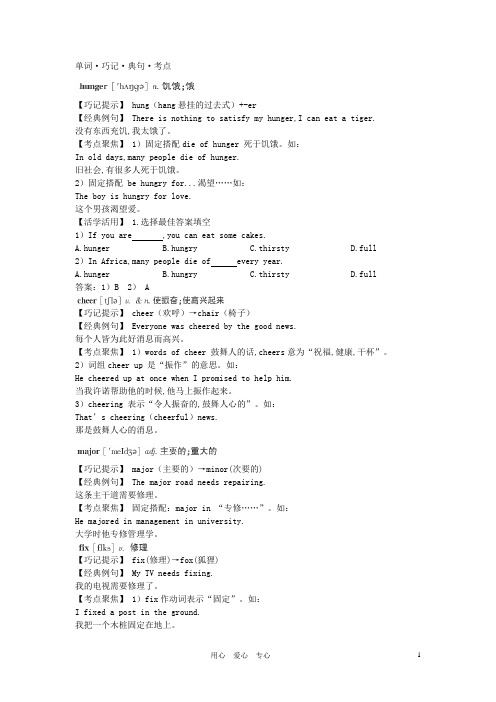
单词·巧记·典句·考点【巧记提示】 hung(hang悬挂的过去式)+-er【经典例句】 There is nothing to satisfy my hunger,I can eat a tiger.没有东西充饥,我太饿了。
【考点聚焦】 1)固定搭配die of hunger 死于饥饿。
如:In old days,many people die of hunger.旧社会,有很多人死于饥饿。
2)固定搭配 be hungry for...渴望……如:The boy is hungry for love.这个男孩渴望爱。
【活学活用】 1.选择最佳答案填空1)If you are ,you can eat some cakes.A.hungerB.hungryC.thirstyD.full2)In Africa,many people die of every year.A.hungerB.hungryC.thirstyD.full答案:1)B 2) A【巧记提示】 cheer(欢呼)→chair(椅子)【经典例句】 Everyone was cheered by the good news.每个人皆为此好消息而高兴。
【考点聚焦】 1)words of cheer 鼓舞人的话,cheers意为“祝福,健康,干杯”。
2)词组cheer up 是“振作”的意思。
如:He cheered up at once when I promised to help him.当我许诺帮助他的时候,他马上振作起来。
3)cheering 表示“令人振奋的,鼓舞人心的”。
如:That’s cheering(cheerful)news.那是鼓舞人心的消息。
【巧记提示】 major(主要的)→minor(次要的)【经典例句】 The major road needs repairing.这条主干道需要修理。
九年级(全册)英语单元知识点、短语及句型总结

Unit 1一、知识点1.2.By: ①通过…..方式(途径)。
例:I learn English by listening to tapes.②在…..旁边。
例:by the window/the door③乘坐交通工具例:by bus/car④在……之前,到……为止。
例:by October在10月前⑤被例:English is spoken by many people.3.how与what的区别:how通常对方式或程度提问,意思有:怎么样如何,通常用来做状语、表语。
what通常对动作的发出者或接受者提问,意思为什么,通常做宾语,主语。
①How is your summer holiday? It’s OK.(how表示程度做表语)②How did you travel around the world? I travel by air.③What do you learn at school? I learn English, math and many other subjects.①What…think of…? How…like…?②What…do with…? How…deal with…?③What…like about…? How…like…?④What’s the weather like today? How’s the weather today?⑤What to do? How to do it?e.g. What do you think of this book?=How do you like this book?I don’do with the matter.=I don’dealwith it.What do you like about China?=How do you like China?I do n’t know what to do next step?=I don’t know how to do it next step?㊣What good / bad weather it is today!(weather为不可数名词,其前不能加a )㊣What a fine / bad day it is today! (day为可数名词,其前要加 a )4. aloud, loud与loudly的用法: 三个词都与"大声"或"响亮"有关。
九年级unit 8知识点
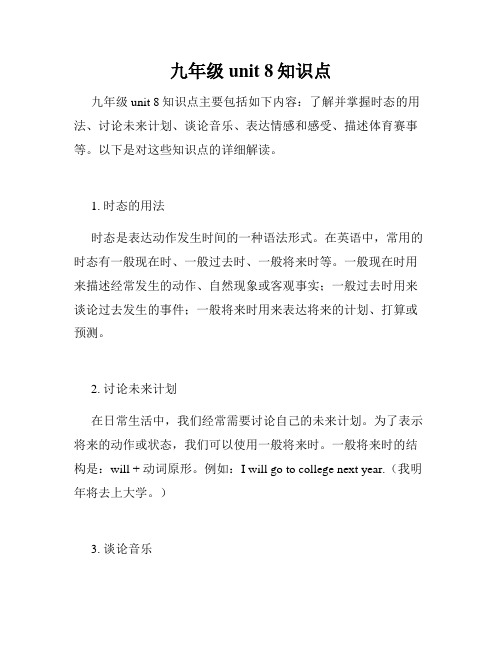
九年级unit 8知识点九年级unit 8知识点主要包括如下内容:了解并掌握时态的用法、讨论未来计划、谈论音乐、表达情感和感受、描述体育赛事等。
以下是对这些知识点的详细解读。
1. 时态的用法时态是表达动作发生时间的一种语法形式。
在英语中,常用的时态有一般现在时、一般过去时、一般将来时等。
一般现在时用来描述经常发生的动作、自然现象或客观事实;一般过去时用来谈论过去发生的事件;一般将来时用来表达将来的计划、打算或预测。
2. 讨论未来计划在日常生活中,我们经常需要讨论自己的未来计划。
为了表示将来的动作或状态,我们可以使用一般将来时。
一般将来时的结构是:will + 动词原形。
例如:I will go to college next year.(我明年将去上大学。
)3. 谈论音乐音乐是人们生活中不可或缺的一部分。
我们可以用英语进行谈论与音乐有关的话题。
例如,我们可以表达自己对某首歌曲的喜爱,或者说出自己最喜欢的音乐类型等。
4. 表达情感和感受在日常交流中,我们经常需要表达自己的情感和感受。
使用适当的形容词和副词可以更好地表达我们的情感。
例如:I feel excited about the upcoming concert.(我对即将到来的音乐会感到兴奋。
)5. 描述体育赛事体育赛事是人们热爱的活动之一。
当我们想要描述一场体育赛事时,需要用到适当的动词、形容词和副词来描绘比赛的进程和结果。
例如:The home team scored a goal in the last minute and won the game.(主队在最后一分钟打进一球,赢得了比赛。
)以上就是九年级unit 8知识点的内容。
通过学习和掌握这些知识,我们可以更好地运用英语进行时间的描述、谈论未来计划、讨论音乐、表达情感和感受、描述体育赛事等。
这些知识点对于我们提升英语口语和写作能力都非常重要,希望你能够认真学习并加以实践运用。
加油!。
人教版英语九年级全册 Unit 8 短语知识点清单.

Unit 8 短语知识点清单
1.这本书属于他
2.去野餐
3.出席音乐会
4.其余的
5.捡起,拾起
6.这些书是谁的?(两种)
7.attend指参加
join指加入
join in指
take part in指
8.互相
9.不同寻常的东西
10.逃跑
11.离开
12.制造噪音
13.没什么
14.有某人或某物正在做某事
15.追逐,追赶
16.同时
17.不但……而且……
18.历史古迹
19.和某人交流
20.指出,说明
21.放在一起,组装
22.用某种方式
23.看见某人/某物正在做某事
24.阻止某人做某事(三种)
25.n. 价值v. 珍视-adj. 贵重
的-adj. 没有价值的,无用的
26.n./v. 睡觉-adj. 困倦的-
adj. 睡着的
27.n. 精力,能量-adj. 精力充沛
的
28.收到某人的来信
29.为了……的目的
故意地
30.发出噪音
n. 声音,噪音-adj. 吵闹的有关声音词的辨析
指不悦耳的吵闹声,用
泛指各种声音,不含有感情色彩,
用
指人说话、唱歌的声音,用31.用于表推测的情态动词
一定,肯定:
可能:
不可能:
32.对不同时态的推测:
对现在事情的推测:
对正在发生的事情的推测:
对已经完成的事情的推测:。
自-九年级unit8重点短语句型

九年级新目标英语unit8短语和重要句型归纳一、重点短语section a1.在户外工作或去外面工作____________2.帮助清扫城市公园____________3.帮助做某事________________4.帮助某人做某事__________________5.分发,发放广告_________________6.使他们高兴起来,使他们振作起来________________7.生病的孩子__________________8.在课后学习活动中__________________9.清洁日_____________10.想出一个计划_____________11.推迟制定计划______________12.清洁日离现在只有两周的时间。
______________________13.写下来___________14.张贴标语____________15.打电话给…____________16.成立,建立一个食物站____________17.自愿做某事______________18.自愿用…做某事______________19.花某人…时间做某事____________________20.某事花费某人…时间_______________21.使…充分发挥作用,好好利用…____________22.没有充分利用…,滥用…___________23.小学_________24.初中__________ 25.高中_____________26.大学_______________27.不但,而且_________28.是某人的家园_________29.训练少年足球队_________30.开办一个中国史俱乐部_________section b31.用完__________________32.与…相像_________________33.修理____________34.赠送___________________35.算出,制定出______________self check andreading36.建一个笔友网站__________________37.闲逛____________38.谢谢某人___________39.因…而谢谢某人_________40.感激某事_______________ 41.帮助某人摆脱困境_________________42.马上________________43.寄(送)给某人某物_____________44.用…把…装满_______________45.无家可归的人们_______________46.是…的家_______________47.极大的奉献______________48.在课后管理中心____________49.热线直播中心______________50.残疾人____________51.动物助手__________________52.家长热线____________53.张贴寻求唱歌工作的广告____________54.学唱歌的钱用完了____________ 55.一只经过特殊训练的狗____________56.训练某人干... ____________ 57.把我的书拿来____________58.词性____________一、重点短语section aﻫ1.workoutside 2.helpclean up the cityparks3.helpto dosth.4.help sb.do sth./helpsb. to dosth./help sb.withsth.5.giveout/handoutadvertisements6.cheer up7.sickchildren/sick kids8.inan after-school study program 9.clean-up day10.thinkup/come up with/think of a plan 11.putoff making aplan12. clean-up day is only two weeksfromnow.=twoweeks away=in two w eeks’ time13.writedown 14.put up signs 15.callup sb.=call sb.=phone sb.=ring up sb.16.setup/establish/startafoodbank 17.volunteer to do sth. 18.volunteer sth. to do sth. (eg. they volunteer their time tohelp people.) 19.ittakessb. some timetodo sth./ sb. takesome time to dos th./sb.spendtime doing/in doing/onsth.20.sth. takes sb. some time. 21.put sth.to good use 22.putsth. to baduse23.elementary school /primary school 24. junior highschool (美)junior middle school(英)25.seniorhigh school(美) senior middleschool(英)26.college/un iversity27.not only…but also…(eg.1.not only we students but alsothe teacher likesplayinggames. 2.notonly theteacher but also we studentslikeplayinggames.3.notonlydo i feel goodabouthelping otherpeople, buti getto spend time doingwhat i love todo.)28.behome to…29.coacha football teamfor kids30.starta chinesehistory clubsectionb31.sb. use out of sth./use sth. up 32.take after/look like/besimilar to33.fix up/repair/mend 34.give away/donate 35.workoutself check andreading36.make a pen palwebsite 37.hang out38.thank sb. 39.thank sb.for sth./doing sth 40.appreciatesth.41help sb. out 42.at once/ right away 43.send sb.sth./ send sth. to sb. 44.fill…with…45.homeless people 46.be hometo … 47. a majorcommitment48.in the after-school care center 49.a call-in center 50.disabled people51.animal helpers52.a call-in center for parents 53.put upsigns asking forsingingjobs54.run out of money forsinginglessons 55.a specially trained dog 56.trainsb to dosth57.fetch mybook 58.part ofspeechﻫ二、句子1.wecan’t putoff making a plan. clean-up dayis only twoweeks from now.我们不能推迟制订计划,清洁日离现在只有两周了。
新人教版九年级英语unit8知识点归纳

新人教版九年级英语unit8知识点归纳新人教版九年级英语Unit 8知识点归纳在新人教版九年级英语教材的Unit 8中,我们学习了许多有关网络与社交媒体的知识,这些知识对于我们现代社会的学习、工作与交流起着重要的作用。
在本篇文章中,我们将对Unit 8中的一些重要知识点进行归纳总结,为大家巩固学习提供帮助。
第一部分:网络和社交媒体的介绍在Unit 8的第一部分,我们了解到了网络和社交媒体对我们的生活产生了巨大的影响。
我们可以通过互联网搜索信息,使用社交媒体平台与朋友分享生活、交流想法。
社交媒体的开展为我们提供了许多便利,但同时也需要我们提高信息的安全意识,避免上当受骗。
第二部分:信息的价值和安全性在这一部分,我们学习了信息的价值以及如何保证信息的安全性。
我们应该正确评估信息的真实性和可靠性,避免被虚假信息所误导。
同时,我们还学习了一些保护个人信息的方法,如设置复杂的密码、不随意分享个人信息等。
第三部分:网络对人际关系的影响网络的兴起对人际关系产生了深远的影响。
我们可以通过社交媒体与朋友、家人保持联系,拓展社交圈子。
然而,过度沉迷网络也会使我们与现实世界的人际交往减少。
因此,我们要学会合理利用网络,保持平衡的生活方式。
第四部分:网络安全问题及解决方法在网络上,我们也会面临一些安全问题,如网络欺诈、网络侵犯等。
我们应该学会辨别垃圾信息,不随意下载和点击可疑链接。
同时,我们还需要保护好自己的个人信息,避免泄露给不明身份的人。
第五部分:虚拟社交和现实社交的比较在这一部分中,我们探讨了虚拟社交和现实社交两种不同形式的人际交往。
虚拟社交使我们能够与更多人联系,但同时也带来了面对面交流的减少。
我们应该在虚拟社交和现实社交之间寻找平衡,发展健康的人际关系。
第六部分:如何利用社交媒体提升自己在这一部分中,我们学习了如何利用社交媒体平台提升自己。
我们可以通过发布优秀的作品、分享知识与经验来展示自己的才艺与能力。
同时,我们还要注意自我管理,避免沉迷于社交媒体而忽视其他重要的事务。
人教版九年级英语Unit8单词、课文知识梳理,词汇句式精讲
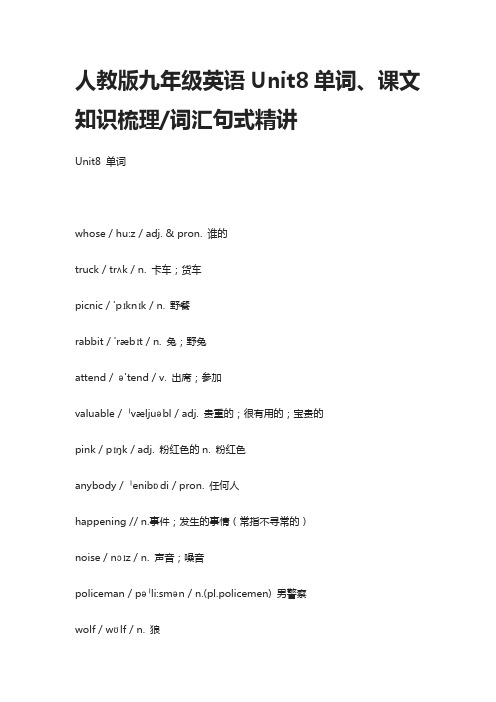
人教版九年级英语Unit8单词、课文知识梳理/词汇句式精讲Unit8 单词whose / hu:z / adj. & pron. 谁的truck / trʌk / n. 卡车;货车picnic / 'pɪknɪk / n. 野餐rabbit / 'ræbɪt / n. 兔;野兔attend / ə'tend / v. 出席;参加valuable / ˈvæljuəbl / adj. 贵重的;很有用的;宝贵的pink / pɪŋk / adj. 粉红色的n. 粉红色anybody / ˈenibɒdi / pron. 任何人happening // n.事件;发生的事情(常指不寻常的)noise / nɔɪz / n. 声音;噪音policeman / pəˈli:smən / n.(pl.policemen) 男警察wolf / wʊlf / n. 狼uneasy / ʌn'i:zɪ/ adj.担心的;不安的laboratory / lə'bɒrətrɪ/ n. 实验室outdoors / ˌaʊtˈdɔ:z / adv.在户外;在野外coat / kəʊt / n. 外套;外衣sleepy / 'sli:pɪ/ adj. 困倦的;瞌睡的land / lænd / v.着陆;降落alien / 'eɪlɪən / n. 外星人run after 追逐;追赶suit / su:t / n. 西服;套装v.适合express / ɪk'spres / v. 表示;表达at the same time 同时;一起circle / 'sɜ:kl / n. 圆圈v. 圈出Britain / ˈbrɪtn / n. (= Great Britain) 大不列颠mystery / ˈmɪstri / n. 奥秘;神秘事物receive / rɪ'si:v / v. 接受;收到historian / hɪˈstɔ:riən / n.历史学家;史学工作者leader / 'li:də(r) / n. 领导;领袖midsummer / ˌmɪd'sʌmə(r) / n.仲夏;中夏medical / ˈmedɪkl / adj. 医疗的;医学的purpose / 'pɜ:pəs / n.目的;目标prevent / prɪ'vent / v. 阻止;阻挠energy / 'enədʒɪ/ n. 精力;力量position / pəˈzɪʃn / n. 位置;地方burial / 'berɪəl / n. 埋葬;安葬honor / 'ɒnə(r) / (= honour) v. 尊重;表示敬意n. 荣幸;荣誉ancestor / 'ænsestə(r) / n. 祖宗;祖先victory / 'vɪktərɪ/ n. 胜利;成功enemy / ˈenəmi / n. 敌人;仇人period / ˈpɪəriəd / n. 一段时间;时期hard-working / hɑ:d 'wɜ:kɪŋ/ adj.工作努力的;辛勤的Stonehenge 巨石阵Unit8 知识梳理【重点短语】1. belong to…属于…...2. toy truck 玩具卡车3. her favorite writer 她最喜爱的作家4. the only little lid唯一的小孩5. listen to pop music听流行音乐6. hair band 发带7. attend a concert 参加音乐会8. in the music hall 在音乐大厅9. something valuable 贵重的东西10.go to a picnic=go for a picnic去野餐11. at the picnic在野餐时12. the rest of my friends 我其余的朋友13. pick it up 捡起,拾起14. each other=one another 互相,彼此15. nothing much没什么(事)16. something unusual不寻常的东西17. something strange奇怪的事18. anything else其它的东西19. be interviewed by…被…采访20. strange noises 奇怪的声音21. outside our window在我们的窗外22. next-door neighbor隔壁邻居23. at first 首先,起初24. run away 逃走25. feel uneasy 感到不安26. have no idea=don’t know 不知道27. go away 走开,离开28. noise-maker 噪音的制造者29. have fun doing sth.做某事开心30. create fear制造恐惧【重点句型】1. If you have any idea where it might be,please call me.如果你知道它可能在哪,请打电话给我。
九年级英语:Unit8_It_must_belong_to_Carla知识点及基础巩固练习

Unit 8 It must belong to Carla.一、重点短语1. hair band 发带2. attend a concert 听音乐会3. the music hall 音乐大厅4. anything valuable 任何有价值的东西5. the rest of my friends 我的其他朋友6. belong to 属于7. at the picnic 在野餐的时候8. pick up 捡起9. in our neighborhood 在我们家附近10. each other 互相11. something unusual 一些不同寻常的东西12. around here 在这儿附近13. be interviewed 被采访14. strange noises 奇怪的噪音15. call the policemen 报警16. something strange 一些奇怪的东西17. next-door neighbor 隔壁邻居18. run away 逃跑19. feel uneasy 感到不安20. the noise-maker 噪音制造者21. create fear 制造恐惧22. make noise 制造噪音23. in the laboratory 在实验室24. try to do sth. 努力做某事 25. take a shower 洗澡26. wear coats 穿着外套27. cough a lot 咳嗽得厉害28. feel sleepy 感到困倦29. catch a bus 赶公交车30. express a difference 表达不同之处31. give a choice 给出选择32. add information 添加信息33. historical places 历史古迹34. not only. •• but also. ••不但......而且......35. greatest mysteries 最大的谜团36. ancient leaders 古代的领袖37. point out 指出38. put together 放在一起39. a burial place 一块墓地40. honor ancestors 尊重先人41. celebrate a victory 庆祝胜利43. a long period of time 很长一段时间44. be hard-working 努力学习45. great planners 伟大的策划者46. stop sb. from doing sth. 阻止某人做某事47. background information 背景信息48. such colorful clothes 如此鲜艳的服装49. at work 在上班二、重点句型1. It must belong to Carla. 它肯定是属于卡拉的。
人教版九年级英语Unit8知识点总结
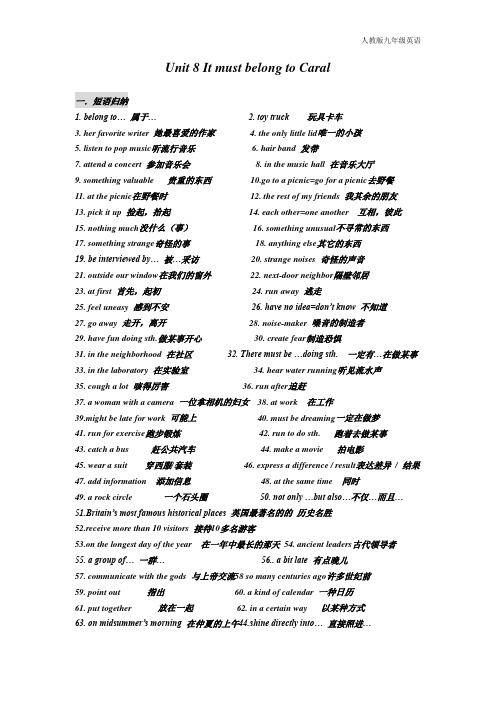
Unit 8 It must belong to Caral一.短语归纳1. belong to… 属于…2. toy truck 玩具卡车3. her favorite writer 她最喜爱的作家4. the only little lid唯一的小孩5. listen to pop music听流行音乐6. hair band 发带7. attend a concert 参加音乐会8. in the music hall 在音乐大厅9. something valuable 贵重的东西10.go to a picnic=go for a picnic去野餐11. at the picnic在野餐时12. the rest of my friends 我其余的朋友13. pick it up 捡起,拾起14. each other=one another 互相,彼此15. nothing much没什么(事)16. something unusual不寻常的东西17. something strange奇怪的事18. anything else其它的东西19. be interviewed by… 被…采访20. strange noises 奇怪的声音21. outside our window在我们的窗外22. next-door neighbor隔壁邻居23. at first 首先,起初24. run away 逃走25. feel uneasy 感到不安26. have no idea=don’t know 不知道27. go away 走开,离开28. noise-maker 噪音的制造者29. have fun doing sth.做某事开心30. create fear制造恐惧31. in the neighborhood 在社区32. There must be …doing sth. 一定有…在做某事33. in the laboratory 在实验室34. hear water running听见流水声35. cough a lot 咳得厉害36. run after追赶37. a woman with a camera 一位拿相机的妇女38. at work 在工作39.might be late for work 可能上40. must be dreaming一定在做梦41. run for exercise跑步锻炼42. run to do sth. 跑着去做某事43. catch a bus 赶公共汽车44. make a movie 拍电影45. wear a suit 穿西服/套装46. express a difference / result表达差异/ 结果47. add information 添加信息48. at the same time 同时49. a rock circle 一个石头圈50. not only …but also…不仅…而且…51.Britain’s most famous historical places 英国最著名的的历史名胜52.receive more than 10 visitors 接待10多名游客53.on the longest day of the year 在一年中最长的那天54. ancient leaders古代领导者55. a group of… 一群… 56.. a bit late 有点晚儿57. communicate with the gods 与上帝交流58 so many centuries ago许多世纪前59. point out 指出60. a kind of calendar 一种日历61. put together 放在一起62. in a certain way 以某种方式63. on midsummer’s morning 在仲夏的上午44.shine directly into… 直接照进…65. the center of the stones石头的中心66. a medical purpose 一个医学目的67. prevent illness 阻止疾病68. move up 上升,提升69. from your feet move up your body 从你的脚上升到你的身体70. the position of… …的位置71.for a special purpose为了一个特别的目的72. a burial place 一个墓地73. a place to honor ancestors祭拜祖先的地方74.celebrate a victory over an enemy庆祝战胜敌人75. a long period of time 很长一段时间二.用法集萃1.must, may, might, could, may, can’t+动词原形表示推测,程度不同must 一定,肯定(100%的可能性)may, might, could有可能, 也许(20%-80%的可能性)can’t 不可能, 不会(可能性几乎为零)例:The dictionary must be mine. It has my name on it.The CD might/could/may belong to Tony, because he likes listening to pop music.The hair band can’t be Bob’s. After all, he is boy!2. take place 常指“(某事)按计划进行或按计划发生”(二者都无被动)happen常指具体事件的发生,特别指那些偶然或未能预见的“发生”例:Great changes have taken place in China since.New things are happening all around us.take place还有“举行”之意。
九年级英语:Unit8_It_must_belong_to_Carla知识点及基础巩固练习
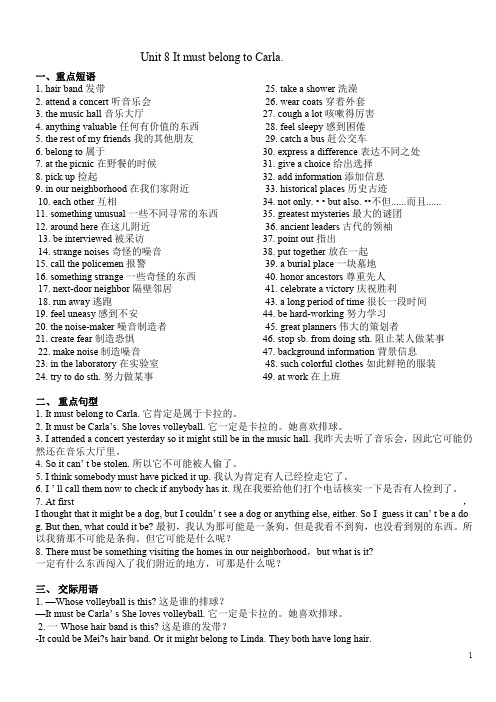
Unit 8 It must belong to Carla.一、重点短语1. hair band 发带2. attend a concert 听音乐会3. the music hall 音乐大厅4. anything valuable 任何有价值的东西5. the rest of my friends 我的其他朋友6. belong to 属于7. at the picnic 在野餐的时候8. pick up 捡起9. in our neighborhood 在我们家附近10. each other 互相11. something unusual 一些不同寻常的东西12. around here 在这儿附近13. be interviewed 被采访14. strange noises 奇怪的噪音15. call the policemen 报警16. something strange 一些奇怪的东西17. next-door neighbor 隔壁邻居18. run away 逃跑19. feel uneasy 感到不安20. the noise-maker 噪音制造者21. create fear 制造恐惧22. make noise 制造噪音23. in the laboratory 在实验室24. try to do sth. 努力做某事 25. take a shower 洗澡26. wear coats 穿着外套27. cough a lot 咳嗽得厉害28. feel sleepy 感到困倦29. catch a bus 赶公交车30. express a difference 表达不同之处31. give a choice 给出选择32. add information 添加信息33. historical places 历史古迹34. not only. •• but also. ••不但......而且......35. greatest mysteries 最大的谜团36. ancient leaders 古代的领袖37. point out 指出38. put together 放在一起39. a burial place 一块墓地40. honor ancestors 尊重先人41. celebrate a victory 庆祝胜利43. a long period of time 很长一段时间44. be hard-working 努力学习45. great planners 伟大的策划者46. stop sb. from doing sth. 阻止某人做某事47. background information 背景信息48. such colorful clothes 如此鲜艳的服装49. at work 在上班二、重点句型1. It must belong to Carla. 它肯定是属于卡拉的。
人教版九年全一册Unit8 It must belong to C知识点总结(含短语句型精讲作文)

人教版九年级全一册英语Unit 8 知识点总结(含短语+句型+精讲+作文)Unit 8 It must belong to Carla.一、课内短语归纳1. belong to 属于2. run after追赶3. at the seem time 同时4. may/might/could be可能是5. must be一定是6. can’t be一定不是7. go to a picnic 去野餐8. the rest of 剩下的9. each other /one another相互,彼此10. pick up 捡起11. be interviewed by 被采访12. have no idea没有主意13. strange noise 奇怪的声音14. have fun doing玩的开心15. feel uneasy 感到不安16. be not sure不确定17. make noise 制造噪音18. in the neighborhood在周围19. go away 离开,走开20. the longest day of the year一年中最长的一天21. a kind of 一种22. in a certain way以一定的方式23. a special purpose 一个特别的目的24. a long period of time很长的一段时间25. point out 指出二、重点词汇解析1. must be“must + 动词原形”表示对现在的情况进行推测或判断,用于肯定句中,语气十分肯定,意为“一定,肯定”。
例如:This must be your room. 这一定是你的房间。
He must be eighty now. 他现在一定有八十岁了。
※ can’t be 意为“不可能是”,表示有把握的否定推测。
例如:He can’t be Mike, for I saw him in the library just now. 他不可能是Mike,因为我刚才还看见他在图书馆呢。
人教版九年级全一册英语Unit8单元语法知识点总结
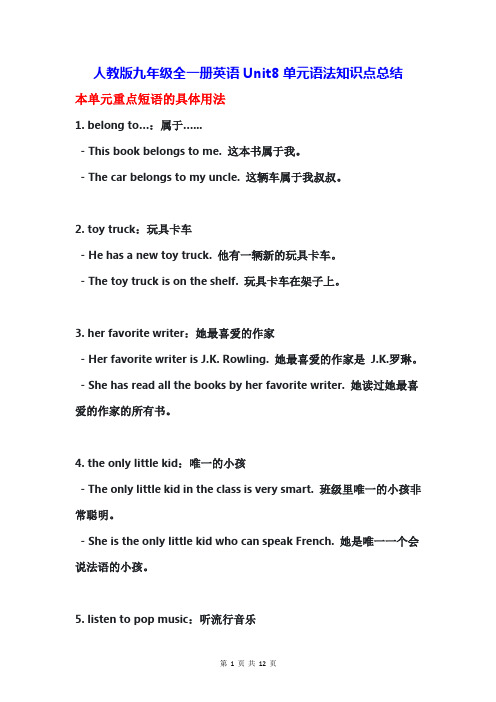
人教版九年级全一册英语Unit8单元语法知识点总结本单元重点短语的具体用法1. belong to…:属于…...- This book belongs to me. 这本书属于我。
- The car belongs to my uncle. 这辆车属于我叔叔。
2. toy truck:玩具卡车- He has a new toy truck. 他有一辆新的玩具卡车。
- The toy truck is on the shelf. 玩具卡车在架子上。
3. her favorite writer:她最喜爱的作家- Her favorite writer is J.K. Rowling. 她最喜爱的作家是J.K.罗琳。
- She has read all the books by her favorite writer. 她读过她最喜爱的作家的所有书。
4. the only little kid:唯一的小孩- The only little kid in the class is very smart. 班级里唯一的小孩非常聪明。
- She is the only little kid who can speak French. 她是唯一一个会说法语的小孩。
5. listen to pop music:听流行音乐- I like to listen to pop music. 我喜欢听流行音乐。
- They are listening to pop music in the car. 他们在车里听流行音乐。
6. hair band:发带- She wears a beautiful hair band. 她戴着一个漂亮的发带。
- The hair band matches her dress. 发带和她的裙子很搭配。
7. attend a concert:参加音乐会- We attended a great concert last night. 昨晚我们参加了一场很棒的音乐会。
九年级英语unit8复习知识点

九年级英语unit8复习知识点Unit 8 is one of the most important units in ninth-grade English. It covers various grammar structures and vocabulary necessary for effective communication. In this article, we will review the key points of Unit 8 without delving into politics or irrelevant information. Let's dive right in!Firstly, let's focus on the use of the present perfect tense. This tense is commonly used to indicate actions that started in the past and still have an impact on the present. For example, "I have studied English for nine years." Here, the speaker started studying English in the past and is still studying it now.Next, let's move on to the usage of the passive voice. The passive voice is used when the subject of the sentence is being acted upon rather than performing the action. For instance, "The book was written by a famous author." In this sentence, the book is the subject receiving the action of being written by someone else.Moreover, we should also pay attention to the formation and usage of informal and formal letters. Informal letters are usually written to friends or family members and have a more casual tone. On the otherhand, formal letters are written for business or official purposes and require a more respectful and professional tone.Furthermore, Unit 8 also introduces us to the concept of reported speech. Reported speech is used when we want to retell or report what someone else said. It requires changes in tense, pronouns, and other aspects to accurately reflect the original speaker's words. For example, "She said, 'I will go to the party tonight.'" becomes "She said that she would go to the party that night."Additionally, vocabulary plays a crucial role in language learning. Unit 8 introduces a range of useful vocabulary words related to various topics such as education, social issues, and technology. It is essential to understand and use this vocabulary in different contexts to become proficient in English.In addition to grammar and vocabulary, Unit 8 also focuses on reading comprehension. Practice reading different texts, such as articles, advertisements, and short stories, to improve both reading speed and comprehension skills. Pay attention to details, identify key ideas, and practice summarizing the main points of a text.Lastly, let's not forget about listening and speaking skills. Listening to authentic English materials, such as podcasts, songs, and movies, can help improve comprehension and pronunciation. Engaging in conversations with native or fluent speakers will enhance our speaking skills and boost confidence.In conclusion, Unit 8 of ninth-grade English covers various grammar structures, vocabulary words, reading comprehension, and listening and speaking skills. By reviewing and practicing these key points, we can improve our overall language proficiency. Remember to utilize different resources, such as textbooks, online materials, and language exchange partners, to reinforce what you have learned. With consistent effort and dedication, mastering the content of Unit 8 will undoubtedly lead to success in English language learning.。
人教版九年级英语unit8知识点
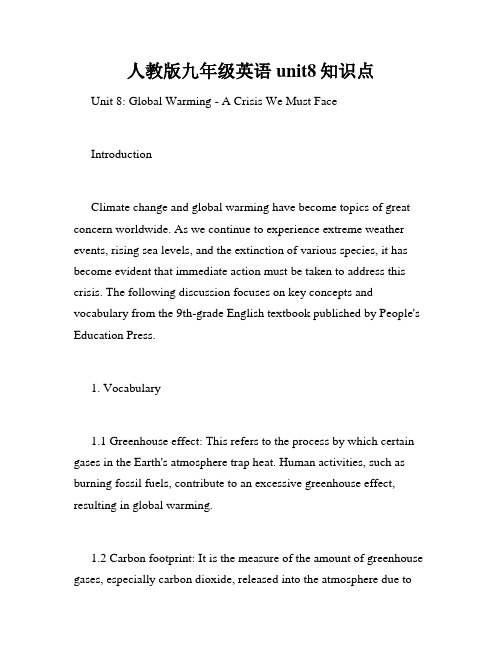
人教版九年级英语unit8知识点Unit 8: Global Warming - A Crisis We Must FaceIntroductionClimate change and global warming have become topics of great concern worldwide. As we continue to experience extreme weather events, rising sea levels, and the extinction of various species, it has become evident that immediate action must be taken to address this crisis. The following discussion focuses on key concepts and vocabulary from the 9th-grade English textbook published by People's Education Press.1. Vocabulary1.1 Greenhouse effect: This refers to the process by which certain gases in the Earth's atmosphere trap heat. Human activities, such as burning fossil fuels, contribute to an excessive greenhouse effect, resulting in global warming.1.2 Carbon footprint: It is the measure of the amount of greenhouse gases, especially carbon dioxide, released into the atmosphere due topersonal activities, like transportation, energy usage, and waste production. Reducing our carbon footprint is crucial to combating global warming.1.3 Renewable energy: This refers to energy generated from sources that can be replenished naturally, such as solar, wind, and hydroelectric power. Utilizing renewable energy sources promotes sustainability and reduces dependence on fossil fuels.2. Causes of Global Warming2.1 Deforestation: The cutting down of trees at an alarming rate contributes significantly to global warming. Trees absorb carbon dioxide and release oxygen, acting as natural carbon sinks. When forests are destroyed, this process is disrupted, leading to increased greenhouse gas emissions.2.2 Burning fossil fuels: The combustion of coal, oil, and natural gas releases large amounts of carbon dioxide into the atmosphere. Industrialization and transportation heavily rely on these fossil fuels, making them significant contributors to global warming.2.3 Increased livestock farming: The expansion of the livestock industry leads to increased methane emissions, a potent greenhouse gas. Methane is released during the digestive process of ruminant animals, such as cows and sheep. Sustainable farming practices can help mitigate this issue.3. Consequences of Global Warming3.1 Melting ice caps: Rising global temperatures cause the polar ice caps to melt at an accelerated rate. As a result, sea levels are rising, endangering coastal cities and habitats, and threatening the stability of ecosystems.3.2 Extreme weather events: Global warming intensifies weather patterns, leading to more frequent and severe heatwaves, hurricanes, droughts, and floods. These events have devastating effects on human lives, infrastructure, and the environment.3.3 Species extinction: Climate change disrupts ecosystems and threatens the survival of numerous plant and animal species. Rising temperatures, habitat loss, and altered migration patterns increase the risk of species extinction, disrupting the delicate balance of biodiversity.4. Solutions to Global Warming4.1 Transition to renewable energy: Governments and individuals need to prioritize the adoption of renewable energy sources. Investing in solar and wind power, improving energy efficiency, and reducing reliance on fossil fuels are crucial steps towards a sustainable future.4.2 Reforestation and afforestation: Planting trees and restoring forests play a vital role in absorbing carbon dioxide and mitigating the harmful effects of global warming. This not only helps combat climate change but also benefits biodiversity and provides economic opportunities.4.3 Education and awareness: Public education campaigns and raising awareness about the consequences of global warming can inspire individual and collective action. Encouraging environmentally friendly practices, such as responsible consumption and waste reduction, will contribute to a greener future.ConclusionGlobal warming poses a significant threat to our planet and its inhabitants. Understanding the causes, consequences, and solutions highlighted in this discussion is essential for addressing this urgent crisis. By collectively taking action, we can strive towards a more sustainable and resilient world, ensuring a brighter future for generations to come.。
人教版九年级英语unit8知识点总结
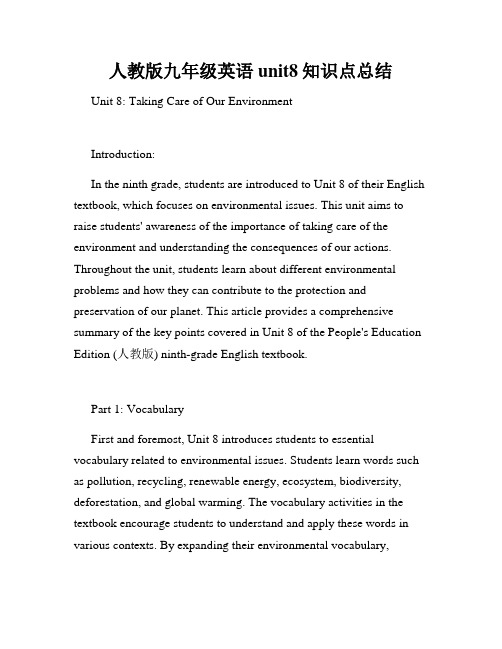
人教版九年级英语unit8知识点总结Unit 8: Taking Care of Our EnvironmentIntroduction:In the ninth grade, students are introduced to Unit 8 of their English textbook, which focuses on environmental issues. This unit aims to raise students' awareness of the importance of taking care of the environment and understanding the consequences of our actions. Throughout the unit, students learn about different environmental problems and how they can contribute to the protection and preservation of our planet. This article provides a comprehensive summary of the key points covered in Unit 8 of the People's Education Edition (人教版) ninth-grade English textbook.Part 1: VocabularyFirst and foremost, Unit 8 introduces students to essential vocabulary related to environmental issues. Students learn words such as pollution, recycling, renewable energy, ecosystem, biodiversity, deforestation, and global warming. The vocabulary activities in the textbook encourage students to understand and apply these words in various contexts. By expanding their environmental vocabulary,students can effectively communicate and express their thoughts on environmental topics.Part 2: Reading ComprehensionUnit 8 includes a series of reading passages that discuss various environmental issues. For instance, one passage explores pollution caused by plastic waste, highlighting its detrimental effects on marine life. Another reading passage talks about deforestation and its impact on the Earth's climate. These texts not only enhance students' reading skills but also provide them with valuable information about real-world environmental problems. Through comprehension questions and discussions, students develop their critical thinking and analytical skills.Part 3: GrammarUnit 8 also covers grammar points that are relevant to environmental topics. For instance, students learn how to use modal verbs, such as should, must, and have to, to express obligations and recommendations related to the environment. Grammar exercises in the textbook reinforce the understanding and application of these concepts. By mastering grammar structures, students can effectively express their concerns and propose solutions to environmental issues.Part 4: WritingTo deepen their understanding and engagement with environmental issues, students are given opportunities to develop their writing skills. Unit 8 includes writing tasks that require students to write formal letters, opinion articles, and poster slogans. These writing activities encourage students to think critically about environmental problems and express their own ideas. By honing their writing skills, students can become effective advocates for environmental protection.Part 5: Projects and ActivitiesUnit 8 promotes active learning through projects and activities. Students are encouraged to work in groups and participate in discussions or debates on environmental topics. They can organize campaigns to raise awareness in their school or community about pressing environmental issues. These group activities not only enhance students' collaboration and communication skills but also instill a sense of responsibility towards the environment.Part 6: Listening and SpeakingThe listening and speaking activities in Unit 8 aim to improve students' communication skills in English while discussing environmental topics. Students listen to dialogues and interviews related to environmental conservation, ensuring exposure to different perspectives. By engaging in role-plays and discussions, students canexpress their opinions, practice their speaking skills, and learn to respect diverse viewpoints.Conclusion:Unit 8 of the People's Education Edition ninth-grade English textbook provides a comprehensive overview of environmental issues. Through vocabulary, reading comprehension, grammar exercises, writing tasks, projects, and activities, students gain a deeper understanding of environmental problems and are encouraged to actively contribute to the well-being of our planet. By completing this unit, students will not only enhance their English language skills but also cultivate a sense of responsibility towards the environment.。
九年级重点知识点归纳unit8
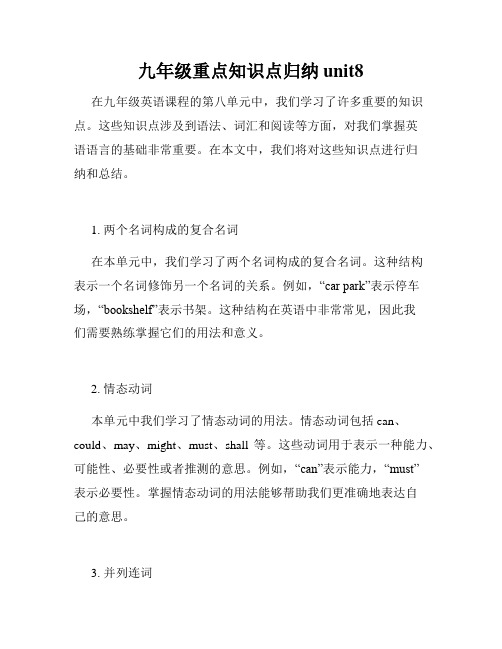
九年级重点知识点归纳unit8在九年级英语课程的第八单元中,我们学习了许多重要的知识点。
这些知识点涉及到语法、词汇和阅读等方面,对我们掌握英语语言的基础非常重要。
在本文中,我们将对这些知识点进行归纳和总结。
1. 两个名词构成的复合名词在本单元中,我们学习了两个名词构成的复合名词。
这种结构表示一个名词修饰另一个名词的关系。
例如,“car park”表示停车场,“bookshelf”表示书架。
这种结构在英语中非常常见,因此我们需要熟练掌握它们的用法和意义。
2. 情态动词本单元中我们学习了情态动词的用法。
情态动词包括can、could、may、might、must、shall等。
这些动词用于表示一种能力、可能性、必要性或者推测的意思。
例如,“can”表示能力,“must”表示必要性。
掌握情态动词的用法能够帮助我们更准确地表达自己的意思。
3. 并列连词在本单元中,我们也学习了并列连词的用法。
并列连词包括and、but、or等,用于连接并列的词、短语或句子。
我们需要注意,并列连词的使用场景和意义,以确保句子结构的正确和连贯。
4. 阅读理解本单元中的阅读理解篇章是关于一个叫做“Ice Station”的科幻小说的片段。
通过阅读这个片段,我们可以提高自己的阅读理解能力,并学习如何从文章中获取关键信息和理解作者的意图。
务必注意细节,从中提炼出关键信息,从而回答问题和理解整个篇章的主题。
5. 词汇在本单元中,我们还学习了许多新的词汇。
这些词汇涉及到人物、地点、事件等方面。
通过扩展词汇量,我们可以更丰富和准确地表达自己的思想和观点。
因此,背诵和应用这些新词汇是非常重要的。
总的来说,九年级英语课程的第八单元涵盖了许多重要的知识点。
我们不能只是简单地了解这些知识点,而是要通过练习和应用,将其真正融会贯通。
只有积极地学习和实践,我们才能在英语学习中取得更大的进步。
希望这篇归纳能够对大家的英语学习有所帮助!。
九年级unit8知识归纳
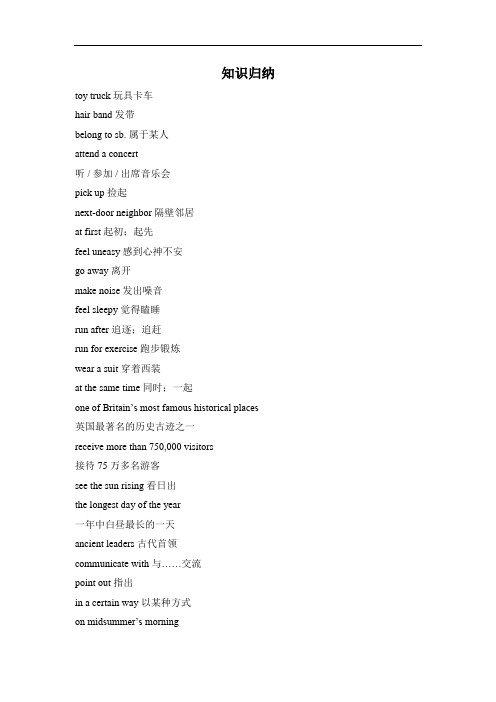
知识归纳toy truck 玩具卡车hair band 发带belong to sb. 属于某人attend a concert听 / 参加 / 出席音乐会pick up 捡起next-door neighbor 隔壁邻居at first 起初;起先feel uneasy 感到心神不安go away 离开make noise 发出噪音feel sleepy 觉得瞌睡run after 追逐;追赶run for exercise 跑步锻炼wear a suit 穿着西装at the same time 同时;一起one of Britain’s most famous historical places英国最著名的历史古迹之一receive more than 750,000 visitors接待75万多名游客see the sun rising 看日出the longest day of the year一年中白昼最长的一天ancient leaders 古代首领communicate with 与……交流point out 指出in a certain way 以某种方式on midsummer’s morning在仲夏的早晨shine directly into the center of the stones 直射巨石阵的中央prevent illness 预防疾病for a special purpose为了一个特殊的目的a burial place 一个墓地a place to honor ancestors一个纪念祖先的地方celebrate a victory over an enemy庆祝打败敌人的胜利over a long period of time在很长一段时间内a group of ... 一群………………………………………………have fun doing sth.做某事很开心feel sb. / sth. do sth.感觉某人 / 某物做某事prevent / stop sb. (from) doing sth. / keep sb. from doing sth. 阻止某人做某事。
- 1、下载文档前请自行甄别文档内容的完整性,平台不提供额外的编辑、内容补充、找答案等附加服务。
- 2、"仅部分预览"的文档,不可在线预览部分如存在完整性等问题,可反馈申请退款(可完整预览的文档不适用该条件!)。
- 3、如文档侵犯您的权益,请联系客服反馈,我们会尽快为您处理(人工客服工作时间:9:00-18:30)。
九年级英语Unit8
(P60,1b,4) help sb. (to) do 帮助某人做某事I often help him (to) study English.我经常帮助他学习英语。
help sb. with sth. 帮助某人做某事I often help him with English
help (to) do sth. 帮助做某事He often helps (to) cook in home.他经常在家帮助做饭。
(P61,2b,2) put off +名词\带出\V·ing:推迟He put off visiting Beijing他推迟访问北京。
(P61,语法表格)cheer (sb.) up 使(某人)高兴、振作如:The news cheers me up 这个消息使我高兴
come up with 提出,想出= think up想出He came up with a good idea.他想出了一个好主意。
=He thought up a good idea.
(P62,3a8行) put …to use 把…投入使用,利用They put the new machine to use. 他们把新机器投入使用
(P62,3a) plan to do 计划做某事I plan to go to Beijing. 我计划去北京。
plan + 从句= I plan (that) I will go to Beijing.我计划去北京。
(P62,3a右面5行)not only …but (also) …:不但…而且…(用来连接两个并列的成分)
(1) 引导以not only …but (also)…开头的句子往往引起部分倒装。
因此⑴Not only do I feel good but (also)…. 是倒装句。
也是说得要把前面的句子中的助动词或者是情态动词放在主语的前面。
如:①Not only can I do it but (also) I can do best. 我不仅能做到而且做得最好。
⑵Not only…but (also)…接两个主语时,谓语动词随后面的主语人称和数的变化也就是就近原则如:
①Not only Lily but (also) you like cat. 不仅莉莉而且你也喜欢猫。
②Not only you but (also) Lily likes cat. 不仅你而且莉莉喜欢猫。
常见的就近原则的结构还有:
Neither…nor…即不…也不…(两者都不) Neither you nor I like him. 我和你都不喜欢他。
Either…or…不是…就是…(两者中的一个)Either Lily or you are a student.
(P64,3a右面5行)run out of = use up 用完,用尽I have run out of money.== I have used up money. 我已经用完了钱。
(p66,阅读1段1行)thank sb for doing 谢谢某人做某事如:Thank you for helping me 谢谢做帮助我
(p66,阅读1段4行)fill…with…使…充满…,用…填充…She filled the bowl with water. 她用水填满碗。
(p66,阅读2段5行)help sb. out 帮助…做事,解决难题(摆脱困境)
I can’t work out this math problem. Please help me out. 我不能算出这道数学问题,请你帮我解决。
(p66,阅读4段1行) train n. 火车
train v. 训练train sb. to do. 训练某人做某事She trains her dog to open the door. 她训练她的狗去开门。
1。
